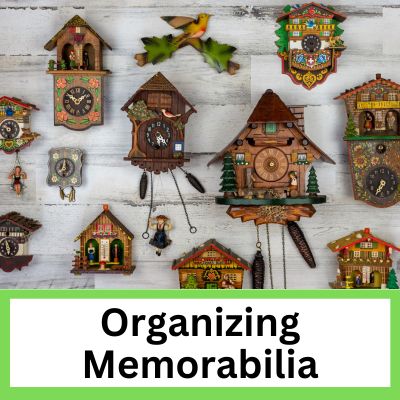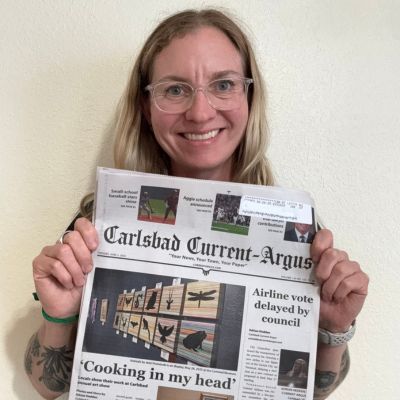Organizing Memorabilia

Memorabilia can take on many different forms. It’s anything that holds sentimental value (or it once did). If not kept in check, it can overwhelm your living space, and make it difficult to enjoy being at home. In this post, I’ll talk about what memorabilia is, why we like it, why we keep it, and what to do about it.
What is memorabilia?
The word memorabilia refers to objects that have been kept because they meant something to you at one time. They are often linked to significant events, people, or experiences. It would be impossible for me to list everything that could be considered memorabilia, but here are some examples:
Paper: cards, certificates, reports, photographs, receipts, tickets
Ceramic: China, mugs, figurines
Plastic: Toys, models, music (CDs, tapes, records)
Fabric: Clothing, blankets, bags
Metal: Awards, coins, jewelry
Wood: Handcrafted items, furniture
Stone: Rocks, crystals
Artwork: Paintings, sculptures, drawings, or any creative expression
Souvenirs: Things that have been purchased by you or someone else while on trips or from special events
Décor: This could be made out of any materials
Equipment: Tools and supplies needed for a particular activity
The list goes on!
Why we like it
Memorabilia can represent our personal history, and remind us of special memories. It can connect us to loved ones who are no longer with us, commemorate achievements, or be part of a collection that you’ve been accumulating over time.
Why we keep it
Sometimes memorabilia is kept because we really want to keep it. But sometimes it’s there because we feel guilty getting rid of it or because we think it has some sort of value. It can also be kept because the emotions we’d have to face to process the memorabilia might be too difficult. Other times, it’s just the sheer amount of time that would be needed to go through it all never reaches top priority. Or it could be a combination of all these reasons! Wherever you are on your decluttering and organizing journey, you are not alone.
When it gets to be a problem
Memorabilia gets to be a problem when we run out of space for it. It also becomes a problem when the compulsion to acquire causes a financial strain. When memorabilia is disorganized, it makes it difficult to enjoy. But the real problem is when it brings us down because the burden to continue to hold on to it all is too much.
What to do about it
Memorabilia must be managed. I’m not saying you have to have everything perfectly organized or inventoried, but it helps to go through it on a regular basis to remember what you have (and to see if you still want it!). It’s common for memorabilia to get stale. The spark that ignited the passion to collect in the first place might fizzle out. And that’s ok! But even if it hasn’t, and you still want to keep it all, when you can organize it and store it properly, it will last a lot longer.
- Sort your memorabilia into categories (if you haven’t already). Since this topic is so broad, you’ll have to decide on what categories make sense to you.
- Let go of anything that you don’t want or need. (More on this below).
- Decide how and where you want to store your stuff. If needed, create a database that lists what you have and where it’s being stored.
- Use the appropriate boxes, display cases, shelves, drawers, bags, frames, or folders to contain your memorabilia.
- Set up a routine that reminds you to either rotate your collection or regularly go through it to make sure things aren’t degrading and that you’re not just storing a bunch of junk you don’t actually want.
Here are some more tips for managing your memorabilia:
- If you’ve got too much on display, consider rotating your collection seasonally or bi-yearly. Museums regularly rotate pieces in and out because if they had it all on display all the time, it would be hard to see it all and appreciate it.
- Learn what kind of storage conditions your collection requires. Will your items get damaged or degrade if they’re stored in a place like a garage or attic that isn’t temperature controlled? How do things need to be wrapped before being stored? What type of boxes does it need to be in? Will humidity effect the quality of your collection? I’ve seen other model horse collectors who have had their collection in a hot attic for years, and some of the horses come out completely ruined! The plastic either shrinks or expands, the paint peels, and it’s really sad for the collectors.
- If you’ve got too much in storage (but you still really want to keep it all), see if there is a local museum or even a restaurant or coffee shop that might want to put your stuff on display on loan.
- Join a Facebook group that is specifically for the type of collection you have. Since there are so many things you need to know about storing and displaying particular items, it pays off to invest some time and energy to see how other like-minded collectors maintain their collections. I’m a Breyer horse collector, so I’ve gotten some great ideas on how to properly store and display these model horses. I’ve even seen how other collectors have created their own databases with Excel or another computer program so they can keep track of everything they have (and want!).
- Similarly to my last tip, research display case ideas that are specifically designed to show off the type of collection you have. Etsy has some really unique options.
- Know your limits! Instead of letting your collection get totally out of control, decide on how much space you want to allow for display or storage before you’ll need to sell or give away some to get more.
Letting Go of Memorabilia
- If you’re wondering about the value of certain items in your collection, look on eBay for “sold listings” to see what the going rate is. Appraising a collection takes time and experience, so if you’re looking for someone to appraise it for you, be prepared to be patient while you find someone you really trust to do this work for you.
- If you’re interested in selling your collection, check out Facebook groups and/or eBay to see which option might work best for you. It’s pretty rare to find a brick and mortar antique shop that’s willing to sell things on consignment or buy an entire collection, but it’s possible you might find a place willing to do this! Even more rare is to find someone who will be willing to sell something on your behalf. With the time it takes to do all the research, post items online, respond to interested customers, and then to pack and ship everything, it’s usually not worth paying someone else to sell something for you.
- If you don’t want to go through the process of selling the things you no longer need, you may need to give it away. I once gave a friend from my networking group my whole Pez collection! I was thrilled that it went to someone who could appreciate the years of collecting, and he was stoked to be getting it! However, you might have already considered everyone you know, and don’t have anyone to give your items to. Posting on a local neighborhood group or special interest Facebook group might be the best way you can connect yourself with someone who will really appreciate what you’re giving away. Or you could check local museums, schools, or libraries to see if your collection would fit with what they display.
- Taking photos or otherwise digitizing your collection can be a great way to preserve the memory without taking up too much physical space.
A note on acquiring as a coping mechanism
Some collections may have accumulated as a coping mechanism for stress, loneliness, trauma, or for many other reasons. Instead of blaming yourself or haphazardly getting rid of your collection out of shame or guilt, work with a professional who can help you get to the root of the issue. Mental health therapists, money counselors, energy workers, or shopping addiction professionals should be able to help you with this. Take your time to find someone who you really like and trust.
A note on “Black Hole” memorabilia
Some stuff you’ve been holding on to might be so emotionally charged or difficult to deal with that you continually put it off. Anything that gets close to this stuff might inadvertently get lumped in to the belief that it’s all too challenging to face. To the best of your abilities, separate out the really hard stuff that you don’t want to make decisions on, and isolate that in it’s own box. Consolidate it so it takes up the least amount of space as possible. Label it well. Don’t force yourself to deal with it before you’re ready. This will allow you to continue making forward progress on the easier stuff. One day you might feel inspired to deal with the really hard stuff. But don’t let this stuff prevent you from getting other areas of your home organized.

Posted By Jean Prominski, Certified Professional Organizer
- Follow me on Instagram @carlsbadsparkle
- Join my Facebook Group, Declutter and Organize with SparkleHomeOrganizing.
- Ready to book a consultation? Complete this form.
- For artwork to energize your home, order through jeanprominski.com.




